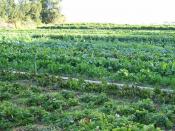ORGANIC FARMING:
A STEP UP FROM AGRIBUSINESS
One might question the merits of organic farming. Products are more expensive, harder to find and not nearly as perfect looking as chemically farmed products, but the pros far outweigh the cons when you take a look at the facts.
Which would you, or your children, rather be eating: Miracle Grow, Round Up, and other petroleum based chemicals, or nutritious vegetables untouched by chemicals? And which would you rather have in the air, the earth, and the water? I don't know about you, but a little manure makes me more comfortable than the chemicals even the government has recognized as health hazards.
I. ORGANIC REGULATIONS
The government has recently passed national requirements for organic products. The specifications of organic have become much more detailed, leaving no room for a non-organic company to profit off use of the word organic on their packaging.
"Foods labeled "100 percent organic" must contain only organic ingredients. Products containing at least 70-percent organic content can be labeled "made with organic ingredients." Those foods labeled simply "organic" must have at least 95-percent organic ingredients, by weight or fluid volume, excluding water and salt. Anyone who knowingly sells or labels a product "organic" that is not produced and handled in accordance with these regulations can face a civil penalty of up to $10,000."1
Besides being aware of the health of their customers, organic farmers are also aware of the health of the environment. Below is a definition of the word "organic" taken from the National Agricultural Library site
In April 1995, the NOSB defined "organic" as follows:
"The primary goal of organic agriculture is to optimize the health and productivity of interdependent communities of soil life, plants, animals and people."2
The United States is not alone in regulating the...


